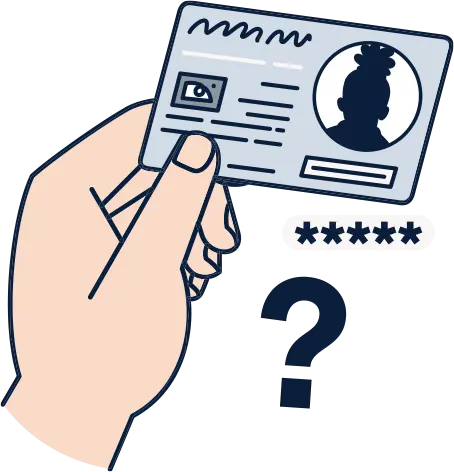Is my Social Security number being used for identity theft?
Our Social Security number (SSN) unlocks intimate access to personal accounts, financial institutions, and government benefits. It’s a vital part of our everyday life, even if we don’t look at it every morning. Because it allows for such exclusive access to important information, online criminals are very interested in what it has to offer them.
In recent years, identity theft has accounted for 19.2% of the fraud-related reports the Federal Trade Commission receives. There is a broad category of tactics someone may use to use an SSN to commit fraud.
These adverse outcomes have cost Americans millions of dollars. Knowing how an SSN could be used to commit fraud helps prevent it from happening to you or your loved ones.
4 ways someone can use your Social Security number
Recent trends documented by the Federal Trade Commission (FTC) have revealed the most common uses for SSN theft. In this guide, we’ll go over four popular types of fraud using an SSN.
Opening fraudulent loans and accounts
Identity thieves often use a Social Security number (SSN) to apply for new loans and accounts. They aim to gather as much funds as possible before they are noticed. These applications and transactions will likely become evident when you receive the corresponding mail in your mailbox.
Another place these fraudulent transactions will appear is on your credit report. Unfamiliar accounts and purchases on your report could mean someone used your SSN. You’ll want to report the fraudulent activity to the credit bureaus and companies involved as soon as possible. Using a credit score monitoring service can help you detect identity theft early and notify relevant entities.
Filing fraudulent tax returns in your name
Among the top frauds reported in recent years were those related to tax return fraud. Bad actors would create accounts at the Internal Revenue Service (IRS) using a stolen SSN. From there, they could request false refunds. The funds would then be routed to their accounts without your knowledge.
Victims may become aware once they try to file their tax refund but aren’t allowed to because the IRS says they’ve already filed. The IRS primarily communicates through the postal service. They could also receive mail regarding a tax refund that they never filed.
If the IRS catches the fraudulent tax filing before you do, you’ll receive a 5071C letter in the mail.
Receiving medical care using your name and SSN
Medical identity theft crimes are a common way someone could use your SSN. Thousands of reports are filed every year to the FTC regarding medical identity theft. In this instance, someone could use a stolen SSN to receive medical procedures. They get access to the victim’s health insurance and use their benefits, piling up medical bills.
In some cases, the medical provider can recognize and stop this fraud due to medical history discrepancies. Other times, the victim is only made aware when they begin to receive calls for the medical debt. Unfortunately, a victim may find out when they are denied certain medical benefits.
Stealing government benefits
According to research conducted by the Federal Trade Commission, “government documents or benefits fraud” has recently been one of the most prevalent types of identity theft reported.
Stolen Social Security numbers can be used to request government benefits like Medicare, Medicaid, and unemployment benefits. One way a victim will know their SSN has been improperly used is through mail correspondence.
In some cases, victims will receive related documentation to the fraudulent benefits request. Another way victims may become aware is by attempting to apply for the benefits themselves and encountering issues.
How do I check to see if someone is using my Social Security number?
The speed at which we are able to detect identity theft has increased. It used to take around three months or a few weeks before a person realized their identity was stolen. Now, you can receive an alert and be notified quickly with F-Secure Total of any possible identity theft threats.
Smart security services and technology have helped millions keep their identities secure. But you can also implement cyber security best practices to protect your family and yourself.
Check your credit report
Any impactful fraudulent activity will likely make its way to your credit report. Monitoring your credit score regularly will help catch any suspicious activity and nip identity theft in the bud.
Every year, you’re allowed a free credit report from the three credit bureaus Experian, TransUnion, and Equifax. Under COVID-19 circumstances, each of the three bureaus provides weekly free credit reports. With the influx of identity fraud, weekly reports help catch and stop identity thieves from doing further damage to your credit.
Review your mail
Reviewing your mail is another way to spot and deter identity theft. Many financial institutions like credit card or loan companies will confirm your billing address and send any relevant information via postal service.
Look out for government communications
The IRS, local government, and federal government agencies will likely send information about account information via mail. Especially regarding identity fraud, checking your mail is one way to prevent missed communications that could lead to more identity theft.
File your tax returns quickly
The sooner you file a tax return, the less likely someone will file one using your information. The best time to file is as soon as you have all the available documentation.
Check your bank account statement
Many people have stopped the progression of identity theft by simply checking their bank accounts. Bank statements help uncover suspicious transactions or patterns. As soon as the fraud is noticed, customers can contact their financial institution to report the fraud, replace cards, and update any sensitive information.
Follow up on rejected applications
Being rejected for a credit application you’re typically likely to receive could be the consequence of a stolen SSN. Many financial institutions will send a letter via mail or email describing why a denial was issued. Reviewing the details for a denial could reveal any signs of unauthorized use of your SSN.
Check your Social Security Statement
Social Security Statements show how much a person has paid in Social Security and Medicare taxes. Once eligible, it informs the taxpayer of the earnings they’ll receive after they’ve reached retirement age. Double-check this information to ensure your SSN isn’t being used to siphon benefits from you.
Investigate random calls from debt collectors
Unexpected calls from debt collectors can be another way to spot identity theft. If your SSN is used to apply for loans, credit cards, or other credit applications, you could be stuck with the debt. Some people may be tempted to ignore phone calls from debt collectors, especially if they believe it is due to a mistake. However, evaluating the calling company can help determine if your personal or financial information has been compromised.
So, what do you do if someone uses your Social Security number?
Stopping identity theft in its tracks will minimize potential damage. Knowing the next best steps can help prevent further consequences and regain security over your identity and SSN. Consider the following instructions should you discover your personal information has been stolen.
Request fraud alerts and a credit freeze
Implementing a credit freeze prevents your SSN and other personal information from being used to apply for credit, apartments, jobs, etc. Contact the three credit bureaus (Experian, TransUnion, and Equifax) to freeze your credit. You can request fraud alerts if you’re unsure if your identity has been stolen. In this instance, you’ll be notified of any new instances of credit applications.
Notify companies where your information was used
Once you’ve pinpointed where your information has been used, contact the involved entities to report the fraud. This includes any loan companies, credit card companies, the IRS, or the Social Security Administration. It may help to gather any relevant information and documentation to create a file and build a case.
Report fraud to the police and FTC
After gathering any relevant documentation, file a police report and report it to the FTC. Unless the situation is extreme, neither agency will intervene with your specific case. However, reporting fraud helps the agencies prevent fraud-related crimes in the future.
F-Secure Total offers robust identity theft protection
Stay up to date with 24/7 online identity monitoring
Frequently asked questions
Can someone use your Social Security number without you knowing?
Yes, someone could be using your SSN and go undetected. However, monitoring credit reports, mail correspondence, and important accounts can help uncover any fraud.
How do I stop someone from using my Social Security number?
You’ll want to request fraud alerts from your financial institutions and credit reporting bureaus. You can also implement a credit freeze where your information can’t be used to apply for credit, housing, or jobs until you unfreeze it. This way, if someone were to use your SSN, they would be blocked or you could be notified.
How do you put an alert on your Social Security number?
Contact the three credit reporting bureaus, Experian, TransUnion, and Equifax and request fraud alerts. Another option is to purchase an ID theft monitoring service including dark web monitoring service like F-Secure Total to monitor your accounts and the Dark Web for you. You’ll receive fraud alerts quickly if someone tries to use your personal information or it is found online.



)

)